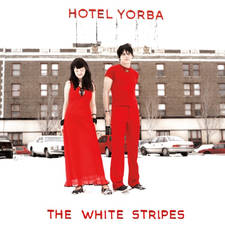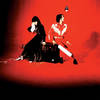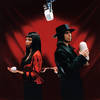On Air Now
X-Posure with John Kennedy 11pm - 2am
20 June 2024, 15:14 | Updated: 20 June 2024, 15:45

Jack and Meg White's indie banger-turned-sports anthem is unmistakable, but just how did it become so popular? As EURO 2024 continues, Radio X digs into the single, its lyrics and how it became an iconic chant.
The White Stripes' Seven Nation Army was an indie hit when it was first released, but over 20 years later it's fair to say the song is more popular than ever.
Why you ask? Well, because it has gone to become one of the most played and chanted songs at sporting events across the globe.
The single, which was the opening track on the band's fourth studio album, Elephant, was first released on 17th February 2003 and wasn't even considered anything special when Jack White came up with its unmistakable riff.
Now, you'd be hard pressed to find someone who doesn't at least recognise the single, which peaked at number seven in the UK singles chart. But how did it go from an indie toe-tapper to a household anthem?
Find out how Seven Nation Army went from potential cutting room floor fodder to becoming The White Stripes' most famous track.

The White Stripes - Seven Nation Army (Official Music Video)
Jack White first crafted the riff for Seven Nation Army in 2002 at the Corner Hotel in Melbourne, while the band were on the Australian leg of their tour. He played it for Ben Swank (Third Man Records co-founder and former member of The Soledad Brothers) who amazingly thought it was just "OK".
White tucked away the idea, saving it for a potential Bond theme before deciding to keep it for The White Stripes later down the line. He of course went on to write and record Another Way To Die with Alicia Keys for 2008's Quantum Of Solace. But five years before that in Toe Rag Studios in Hackney, London, Seven Nation Army was back on the agenda, with Jack White wanting to set himself the challenge of composing a song without a chorus. He referred to it as "a little experiment" and we'd say it was certainly one that paid off.

Jack White talks impact of Seven Nation Army
So surely it was recognised as a bonafide banger once it was in the can? Well... actually no. Even after Jack White recorded it and it made its way onto the band's fourth album, the record company still didn't think it was going to be Elephant's stand-out hit.
"It's a compelling idea, thinking about singles," the rocker mused back in 2010. "Nobody knows. Record labels don't know, artists don't really know most of the time. I can think back to when Elephant came out I wanted to put Seven Nation Army out as a single. The label in England and the label in America both didn't want to.
"They wanted to put [out] There's No Room For You Here... Can you imagine not putting Seven Nation Army out as a single?!"
Seven Nation Army is best known for its distinctive riff, which acts the heartbeat of the song and makes it unmistakeable no matter where it's played. It has the effect of a bass line, but it was actually written on guitar and tuned down an octave, which is probably why it's so catchy by the time it reaches the climax. And then there's its famous 'lyrics'. Seven Nation Army's famous chant can be heard from England football terraces to the stadiums of Brazil and it's easy to see why.
It has no chorus, or rather it has a 'lyric-free' chorus, which follows the song's original riff, meaning fans can easily sing along to its melody. UK fans in particular have been known to use it to sing the names of some of their most beloved football players... providing they have the right amount of syllables, that is. And who can forget the chants of "Oh, Jeremy Corbyn," which rang out across Glastonbury 2017?

Jeremy Corbyn at Glastonbury 2017
Jack White agreed that it's this distinct lack of lyrics, which makes the song so universal.
Speaking of the impact of the single, he told Radio X': "The interesting thing about that, I think some person in music said they thought it was the biggest multicultural hit of all time because there's no words, that they're chanting a melody and there's no need to know the language or to know the words of the song."
He added: "So that kind of gets up there with the 'Na Na Na Na' from [The Beatles'] Hey Jude or something like that where you don't need to know any different languages.
"It's the language of music across the board and that sort of becomes folk music at that point. Who could ask for more than that as a songwriter?"

Jack White talks impact of Seven Nation Army
Various sources trace the origins of the Seven Nation Army chant to Belgium's Club Brugge KV fans, who chanted the riff during the team's Champions League match in Italy against AC Milan in October 2003. Apparently, this continued once their striker Andrés Mendoza scored a goal and after Club Brugge KV went on to win the game, the song subsequently became the team's unofficial anthem. It cropped up again during Italy's 2006 World Cup win and then was used as a walk on song for the teams during Euro 2008. By the time it got to Euro 2012, the song was being played whenever a goal was scored, so it's easy to see why it became so synonymous with football.
Despite the chant of Seven Nation Army having no lyrics, the song itself has plenty. According to Jack White, it was inspired by the growing attention and scrutiny faced by the band... namely the attention surrounding his relationship with drummer Meg White, who was by this point his ex-wife (though they famously portrayed themselves as siblings). "The song's about gossip. It's about me, Meg and the people we're dating," said the frontman. Naturally, the rocker turned his struggles into art... by telling a story about a man riding into town and having to fight off a load of enemies. And the song's opening makes it clear that he's not taking any prisoners as Jack White issues a call to arms, telling the listener "I'm gonna fight 'em off".
Though it sounds incredibly purposeful and arresting, Seven Nation Army was apparently just a working title to the song. According to folklore, it was a nod to how Jack White would mispronounce Salvation Army as a child.
Get the full lyrics to Seven Nation army here
I'm gonna fight 'em off / A seven nation army couldn't hold me back
Jack White hadn't visited the Kansas location at the time he wrote the song, but Wichita, which is referenced in the last verse of the anthem, was a metaphor for escaping the pressures of fame and forgetting about his past life, swapping it out for a simple one where he works on the land. Of course, by the end of the track, we know it's merely a fleeting thought as the rocker resolves to face his destiny and "Go back home".
I'm goin' to Wichita / Far from this opera forevermore
Get the full lyrics to Seven Nation army here
Seven Nation Army's impact isn't just limited to mass events. It's also been covered and sampled many times over by everyone from The Flaming Lips to Metallica. And who can forget the much maligned version released by X Factor's Marcus Collins in 2012? Many bands use the songs to get the crowds going during their live shows and even blend snippets of it with their most famous tracks. The single has most notably been sampled by the likes of Pitbull on his 2010 track Gimme A Bottle and by Hardstyle Masterz on Beat Diz in 2003. However, perhaps the most obvious sample comes from former rapper Apathy who released his take on the track, with the rather on the nose title It Takes a Seven Nation Army to Hold Us Back, featuring Emilio Lopez.

All things considered, it's not difficult to see why The White Stripes track has gone down in the history books as one of the most iconic tracks of all time.
So whether you've been living in a cave or avoiding the EUROs this year, we're sure it'll be coming to a venue or gathering near you!



